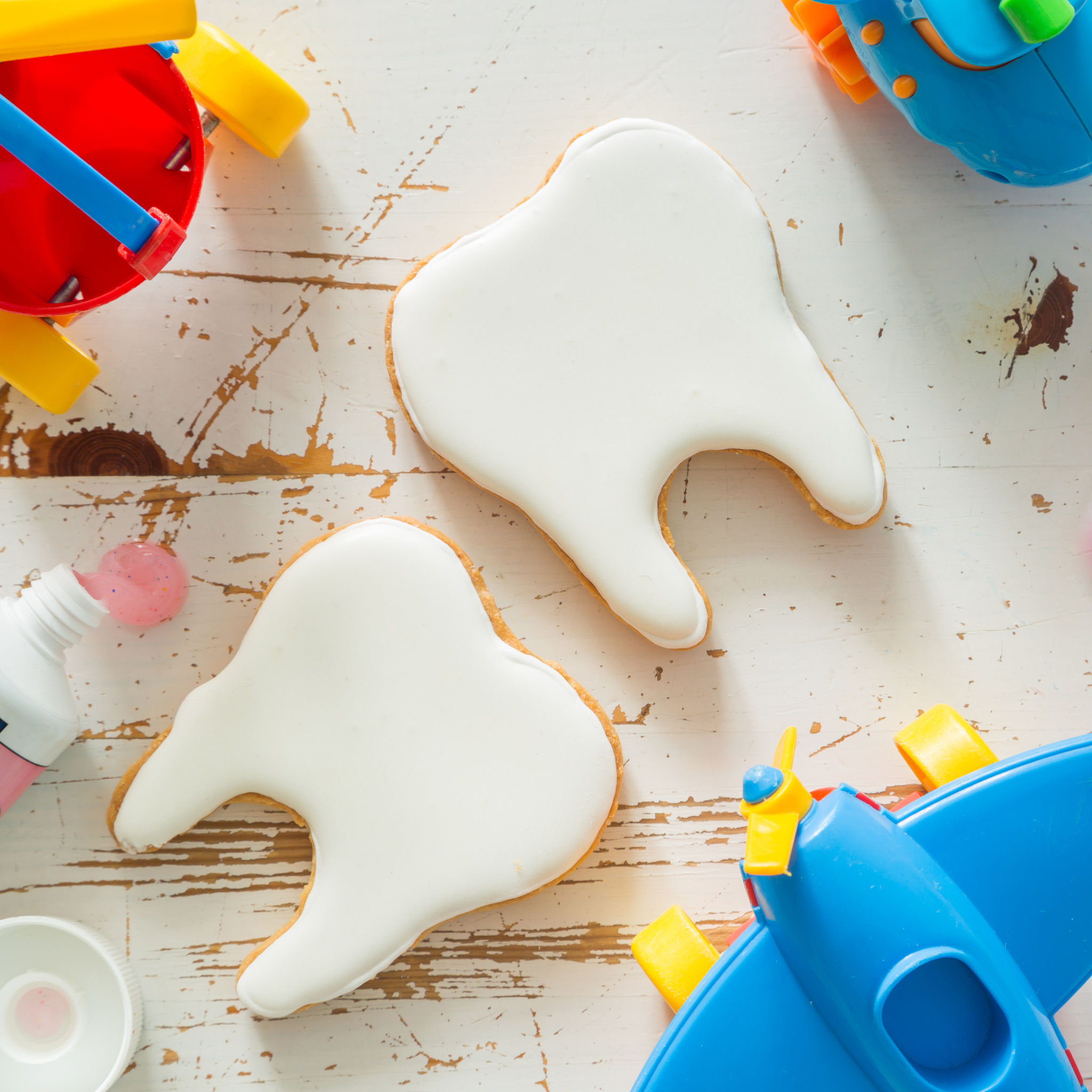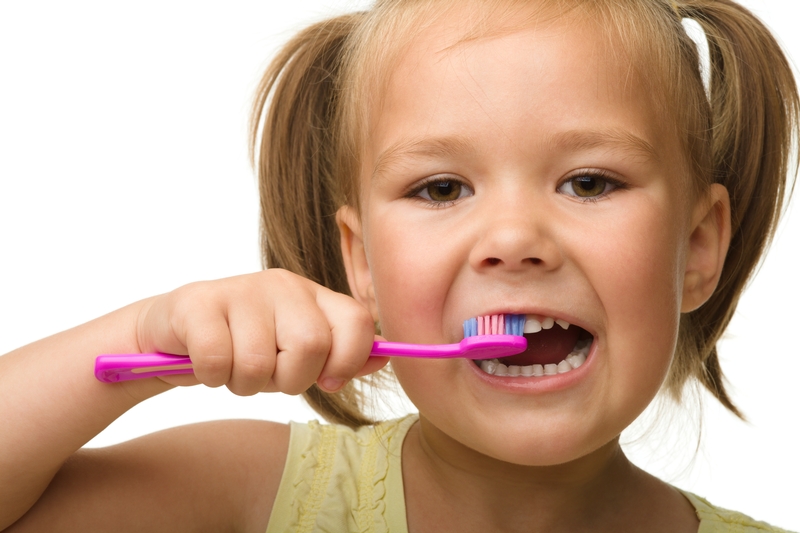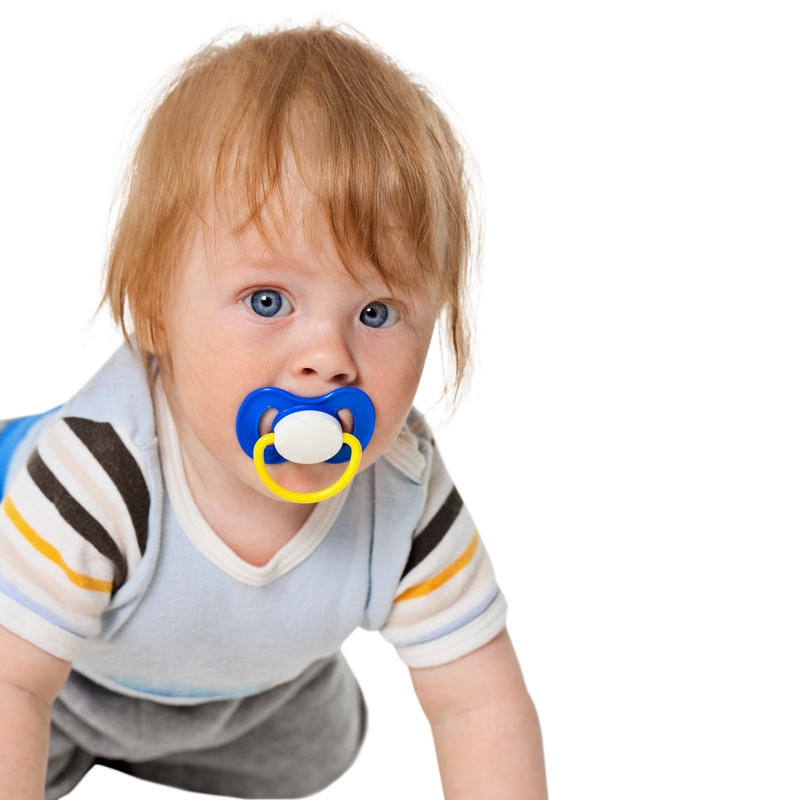Start ’em early! It’s never too soon to start imparting to your children the importance of good oral hygiene. Experts say as soon as your baby starts getting teeth in, you should begin cleaning them, and here at Tedford Family Dentistry we fully subscribe to this belief. You can start by wiping your baby’s teeth clean with a soft cloth and warm water. When your baby reaches the 18 months mark, you can begin brushing your baby’s teeth with a pea-sized amount of low-fluoride toothpaste. As they grow, they can begin taking more and more ownership of the task, but for a good while, they will need a lot of help and supervision.
Establishing these good oral health habits out the gate will help reduce the risk of tooth decay and cavities in baby teeth, of course, but getting into an early routine of regular brushing will also likely carry over into adulthood. Make it a priority to help your young children brush their teeth at least twice a day, and increase the chance that those good habits will stick.
When your little ones are young, it’s helpful to find ways to make brushing fun. Let them choose their own toothbrush at the store with colors or characters they love. Brush your teeth with your child, or even let them brush your teeth for fun. Use a timer so it feels like a game, but also reminds them to brush for the right amount of time, ensuring they target each area of the mouth for a thorough cleaning.
It’s no surprise that kids who learn great brushing and flossing habits early in life experience far less dental issues in adulthood. Laying that foundation is imperative. By age 5, nearly 50% of children have had one or more cavities! A lot of parents buy into the belief that decay in baby teeth doesn’t matter since those teeth will eventually be lost and replaced with permanent ones; however, this is a gross misconception. Decay in baby teeth can, in fact, have an adverse effect on the health of adult teeth, and can lead to dental issues later in life. This is why it’s so important to be proactive about preventative care from the get-go, caring for your baby’s teeth as soon as they begin to come in.
Every pediatric dentist would agree that teaching your kids to actually brush their teeth with regularity is only part of the job. You also need to teach them the proper techniques to be completely successful. Most parents are familiar with this scenario. Your child puts a glob of toothpaste on a toothbrush, half of which finds its way into the sink (aka NOT into your child’s mouth), and he or she spends maybe 15 seconds lathering it up before a quick spit, and they’re on their merry way. Not gonna cut it. You can help your child learn how to do a better job by demonstrating the best way. Brush your teeth at the same time, showing your child the best brushing techniques. This way they can also get a better feel for how much time they should be spending on the task.
The American Dental Association recommends a full two minutes of brushing. Several seconds of aggressive brushing can actually be harmful and cause distress to teeth and gums. This is a great case of slow and steady wins the race. Teach your kids to take their time, concentrating on all surfaces of their teeth, as well as the tongue and gums. Lots of bacteria live here, and it takes diligence to combat those germs that can cause bad breath as well as gingivitis.
Leading by example will be key in teaching your children these healthy oral care habits, but you should also ensure they receive the recommended preventive care from an expert pediatric dentist. That’s where we come in! At Tedford Family and Pediatric Dentistry in Ooltewah, TN, we take a preventative approach and believe trips to the dentist can be fun. We go to great lengths to ensure our young patients have positive experiences each time they come in to see us, and we are in it for the long haul. Whether the patient is one year old, or ninety, we believe in providing the best possible care, encouraging great habits, and keeping your pearlies looking and feeling their very best.
 An entire month to celebrate dental awareness? Yep, and it’s one of our favorites! Celebrate National Children’s Dental Health Month this February with us as we promote healthy gums, teeth, and overall oral hygiene in children. Looking for ways to improve your child’s dental habits? Here’s what you need to keep your little one’s teeth clean and healthy.
An entire month to celebrate dental awareness? Yep, and it’s one of our favorites! Celebrate National Children’s Dental Health Month this February with us as we promote healthy gums, teeth, and overall oral hygiene in children. Looking for ways to improve your child’s dental habits? Here’s what you need to keep your little one’s teeth clean and healthy. Good oral health habits start when children are young. Our Ooltewah dentist understands that it can be a challenge to get your children to brush their teeth. Here are a few helpful tips to make teeth brushing a little more fun:
Good oral health habits start when children are young. Our Ooltewah dentist understands that it can be a challenge to get your children to brush their teeth. Here are a few helpful tips to make teeth brushing a little more fun: Q: Energy drinks don’t cause cavities?
Q: Energy drinks don’t cause cavities? From the cold unusual objects to unfamiliar surroundings, children and adults alike share fears of the dentist. No matter the fears, visits to the dentist will keep teeth healthy and promote good oral health habits. Here are a few tips to keeping the fears at bay and their smile pearly white.
From the cold unusual objects to unfamiliar surroundings, children and adults alike share fears of the dentist. No matter the fears, visits to the dentist will keep teeth healthy and promote good oral health habits. Here are a few tips to keeping the fears at bay and their smile pearly white.
The Earlier the Better
The younger a child is when they start visiting a dentist, the more likely they will become comfortable with the surroundings and the dentist. According to the American Academy of Pediatric Dentistry, your child’s first trip to the dentist should be at age one or when their first tooth is visible. Early prevention will increase the overall health of your mouth.
According to several studies, more preschool students have cavities than ever before. The national study states that, “more than 1 in 4 children in the United states has had at least one cavity by the age of 4. Many kids get cavities as early as age 2.”
Don’t Over Share
Try not to share too many details before dental appointments. Too much explaining can result in more questions as well is scare many children. Keep a positive attitude and let the dentist and hygienists explain the procedures. Also, refrain from taking your children to your dentist appointment. Even though you may not realize it, you may be anxious. Telling about past or current procedures can instill more fear, especially if those procedures are not necessary.
Play Pretend
Grab a toothbrush and let your child practice being both the dentist and the patient. Brushing and counting teeth will help to prepare them for the actual office visit. You want your child to become familiar with the routine in hopes that they will be more comfortable with the procedures. Additionally, there are a variety of children’s books with illustrations that are design to educate and relieve fears of the dentist.
Fussing is Normal
Pediatric dentists are used to children and tantrums. It is normal that a child will cry, whine or fuss during an appointment. Allow the staff to guide and direct you. Many will ask that you hold your child’s hand to help comfort them during the visit. If your little one has a favorite toy or stuffed animal, bring that as a comfort and distraction.
Encouraging the importance of good dental health is important. Explain that the dentist helps to keep their smile pretty, and that regular visits are necessary. Follow these tips are your child is sure to overcome their fears.
Our Ooltewah pediatric denistry office can help calm your child's fears of the dentist as well as keep their teeth pearly white.
Written by Tiffany Hutton Sucking on a thumb or pacifier is extremely common in babies and toddlers. It offers a sense of safety, security and relaxation. However, prolonged sucking on a pacifier or thumb can result in a variety of dental issues. Thumb sucking or the use of a pacifier after age two can lead to a misalignment of teeth, changes in the shape of the roof of the mouth and result in problems with proper mouth growth. The risk of dental complications increases if the behavior continues after the teeth start coming in.
Sucking on a thumb or pacifier is extremely common in babies and toddlers. It offers a sense of safety, security and relaxation. However, prolonged sucking on a pacifier or thumb can result in a variety of dental issues. Thumb sucking or the use of a pacifier after age two can lead to a misalignment of teeth, changes in the shape of the roof of the mouth and result in problems with proper mouth growth. The risk of dental complications increases if the behavior continues after the teeth start coming in.